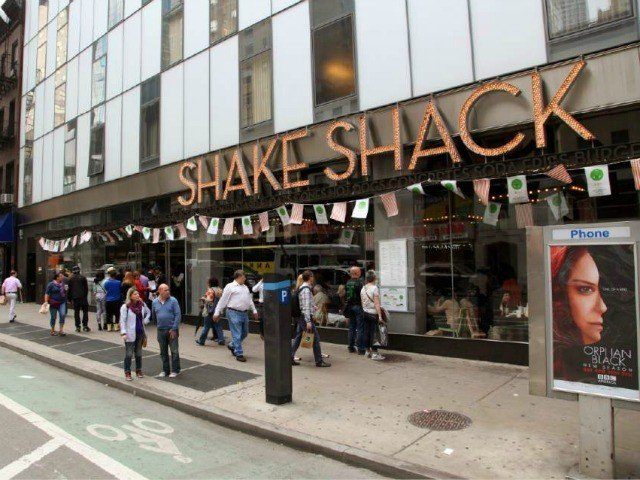Anyone old enough to recall the Bush presidency might remember that the media used to be very, very concerned about “burger-flipper jobs,” median wages, and career quality. Bush’s fantastic unemployment rates were supposed to be marred with a big fat asterisk because too much job growth was occurring in low-wage, dead-end service industry jobs.
But never mind all that now! There’s a Democrat in the White House, so nothing–and I do mean nothing–matters to the media except whatever the best possible job growth statistic at any given moment might be. Don’t worry your pretty little heads about workforce decline, stagnant wages, the massive conversion of full-time work to part-time jobs (due in no small part to Obamacare’s twisted incentives), or even “income inequality.” Well, okay; you’re supposed to worry about “income inequality” a bit, provided you swear not to hold Barack Obama in any way accountable for its growth during his term. Actually, tell you what: how about if you don’t worry about income inequality right now, but fear it as a dark horseman that will gallop over the horizon–as soon as a Republican President takes office? Homelessness will return as a crisis at right about the same time. It’ll be just awful.
Meanwhile, every positive economic indicator is to be celebrated in a vacuum as proof of Sun King Obama’s brilliance, even if it took six years of grinding unemployment and trillions of dollars spent to get here. Wall Street’s doing great and should be celebrated uncritically for as long as Barack Obama is guest of honor at the celebration.
Oh, by the way, the big growth industry at the moment is restaurants. You know, the places that employ “burger flippers,” along with salad tossers, given the popularity of healthier fast food these days. The Washington Post, in the course of commemorating a very successful IPO by the Shake Shack restaurant chain, mentions that “four of the five best-performing IPOs in the consumer category were restaurants” last year:
Shake Shack’s announcement comes on the heels of a hot streak for restaurant IPOs. The Habit Burger Grill, another fast-casual chain, has seen its stock soar nearly 90 percent over its IPO price. Zoe’s Kitchen, a Mediterranean salad and sandwich chain, and El Pollo Loco, a grilled chicken restaurant, also had strong trading debuts this year. According to IPO research firm Renaissance Capital, consumer companies–a category that includes restaurants–saw a 30.8 percent average IPO return in 2014. That’s significantly higher than the returns seen on splashier IPOs in the tech sector, where average return was just 13.5 percent.
Analysts think there’s nowhere to go but up in the higher end of the fast food market, which gives much of the flavor and atmosphere formally offered by more formal diners, but with fewer people on staff and less expense for diners, generally including the absence of waiters in need of tipping:
“I don’t think we’re anywhere near the end of fast-casual growing faster than other components of the industry,” said Dennis Lombardi, food service strategist for retail consultancy WD Partners.
Indeed, Shake Shack will face no shortage of competition as it vies for diners seeking premium burgers. Five Guys already has deep market penetration in urban areas, and small chains such as SmashBurger and The Habit have seen explosive growth lately. Market research firm Technomic reports that burger chains pulled down $72 billion in U.S. sales in 2013. While burger restaurants overall saw only meager growth of 1.2 percent, fast-casual outposts fared much better, recording growth of 10.4 percent.
Certainly, the heart of any capitalist is warmed by the sight of creative entrepreneurs finding and filling a niche. The problem is that a healthy economy has lots of niches, and many of them provide the sort of employment that leads to robust career growth. For years, the media has studiously avoided mentioning the massive migration of career positions into part-time and temporary work; they simply stopped dwelling on the internals of unemployment reports when Obama took over for Bush. They had it right the first time, although they were always wrong to miscast “burger-flipper” jobs as inherently bad. They’ve got a solid place in any robust economy. Entry level work is the transmission belt to career growth, especially for people who don’t secure expensive college degrees. The problem today is that it’s getting hard to see where all the people carrying six figures in college debt are going to work. They won’t be paying off those loans with a lifetime career of waiting tables.

COMMENTS
Please let us know if you're having issues with commenting.